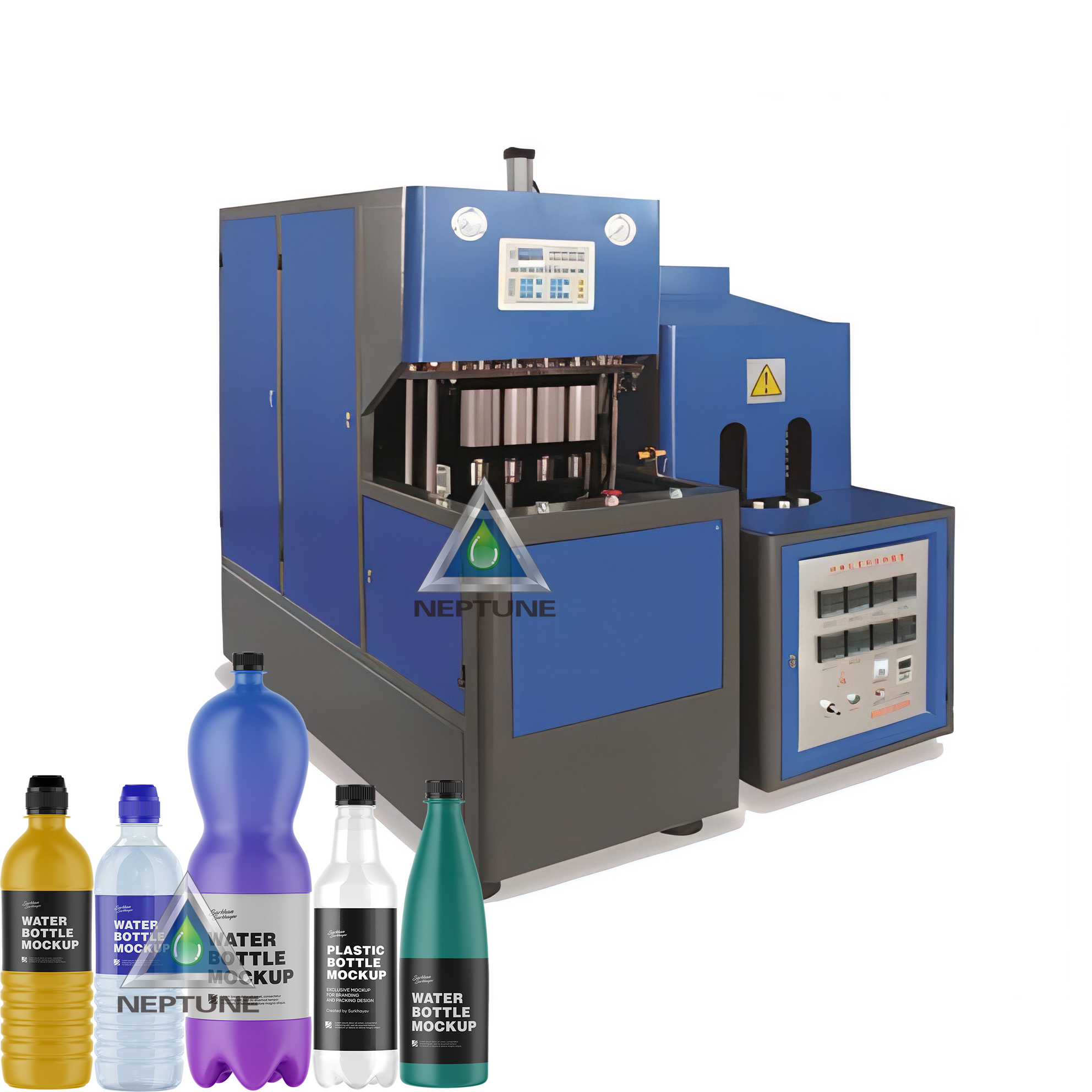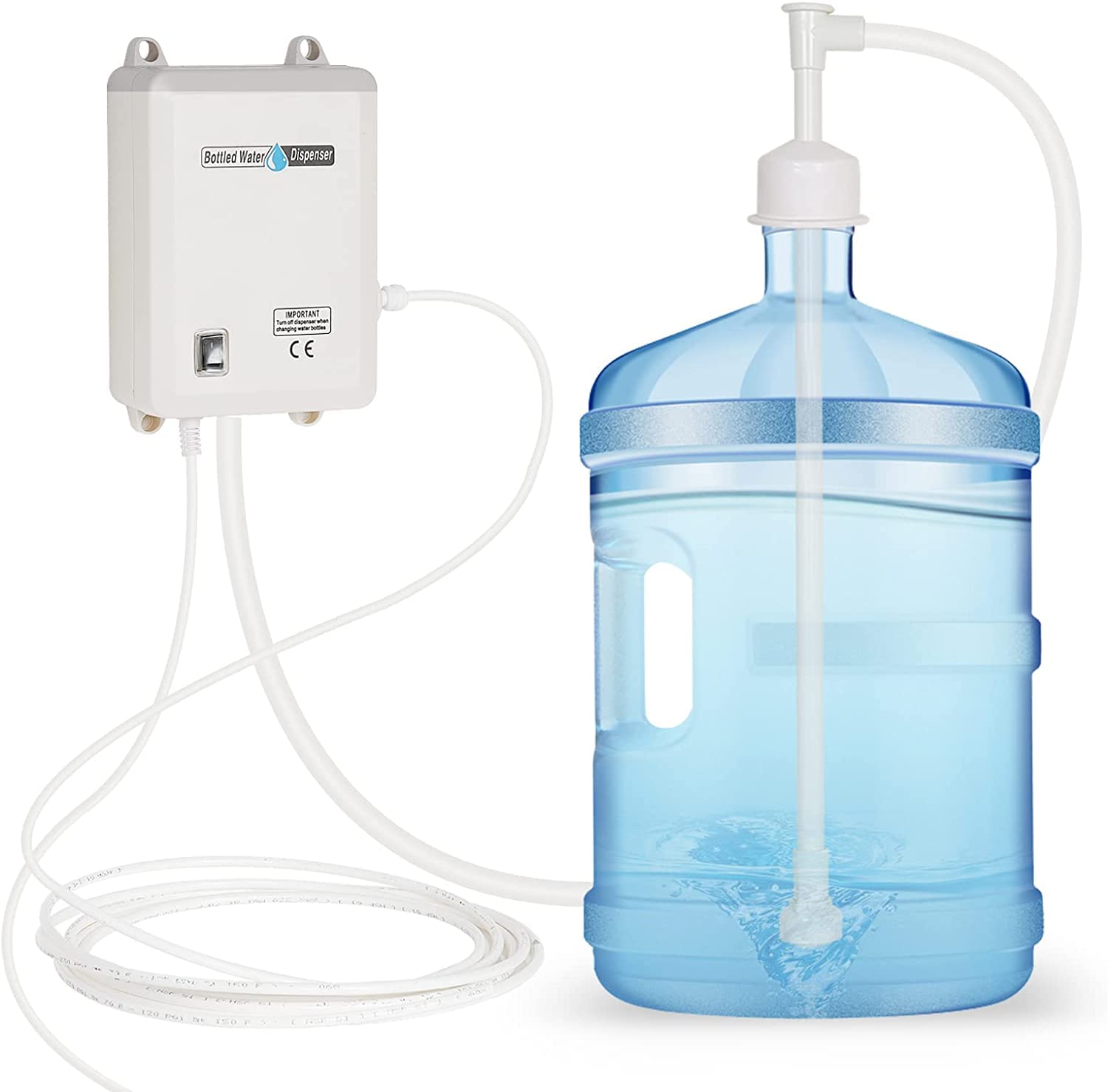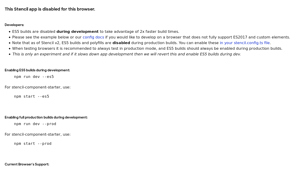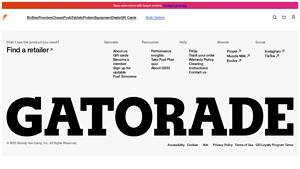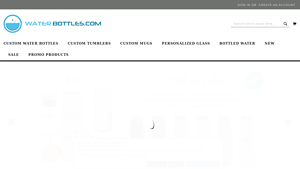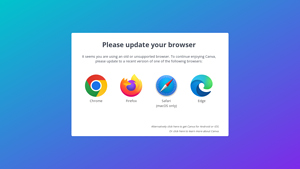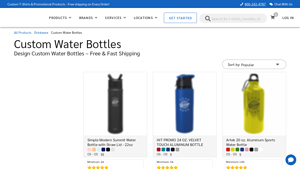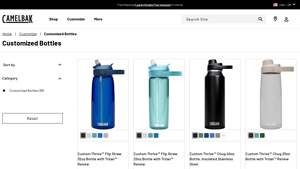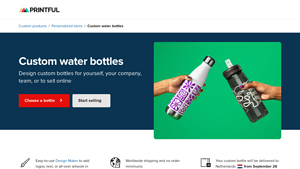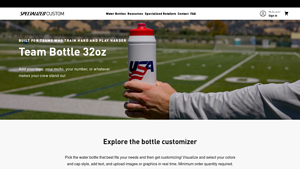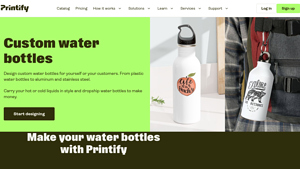مقدمة: الإبحار في السوق العالمية لصناعة زجاجات المياه
في السوق العالمية المتطورة باستمرار، يمثل الحصول على صانع زجاجات مياه موثوق به تحديًا فريدًا للمشترين الدوليين من الشركات. فمع ارتفاع الطلب على زجاجات المياه المستدامة والقابلة للتخصيص في جميع المناطق، بما في ذلك أفريقيا وأمريكا الجنوبية والشرق الأوسط وأوروبا، يصبح فهم الفروق الدقيقة في هذا السوق أمرًا بالغ الأهمية. يعد هذا الدليل الشامل بمثابة مورد استراتيجي، حيث يقدم رؤى حول أنواع مختلفة من زجاجات المياه وتطبيقاتها وأحدث الاتجاهات في التخصيص.
وسيستفيد المشترون من التحليلات المتعمقة لعمليات فحص الموردين، مما يمكنهم من تحديد الشركات المصنعة الجديرة بالثقة التي تتوافق مع احتياجاتهم الخاصة. بالإضافة إلى ذلك، يتعمق الدليل في اعتبارات التكلفة، مما يساعد الشركات على اتخاذ قرارات مستنيرة توازن بين الجودة والقدرة على تحمل التكاليف. من خلال تقديم رؤى قابلة للتنفيذ وتوصيات الخبراء، يمكّن هذا الدليل المشترين من الشركات من التعامل مع تعقيدات توريد زجاجات المياه بفعالية. سواء كنت في المملكة العربية السعودية تتطلع إلى تحسين منتجاتك الترويجية أو في نيجيريا تبحث عن خيارات مستدامة لأعمال البيع بالتجزئة الخاصة بك، فإن هذا المورد يزودك بالمعرفة اللازمة لاتخاذ قرارات شراء استراتيجية تدعم أهدافك التشغيلية.
التنقل بين المقالات
- قائمة المُصنعين والموردين لأفضل 9 صانعات زجاجات المياه
- مقدمة: الإبحار في السوق العالمية لصناعة زجاجات المياه
- فهم صانع زجاجات المياه أنواعها وأشكالها المختلفة
- التطبيقات الصناعية الرئيسية لصانع زجاجات المياه
- 3 نقاط ألم شائعة لدى المستخدمين "صانع زجاجات المياه" وحلولها
- دليل اختيار المواد الاستراتيجية لصناعة زجاجات المياه
- نظرة متعمقة: عمليات التصنيع وضمان الجودة لصانع زجاجات المياه
- دليل عملي للمصادر: قائمة مراجعة خطوة بخطوة لـ "صانع زجاجات المياه
- التحليل الشامل للتكلفة والتسعير لصانع زجاجات المياه تحليل شامل للتكلفة والتسعير
- تحليل البدائل: مقارنة صانع زجاجات المياه بالحلول الأخرى
- الخصائص التقنية الأساسية والمصطلحات التجارية لصانع زجاجات المياه
- الإبحار في ديناميكيات السوق واتجاهات التوريد في قطاع صناعة زجاجات المياه
- الأسئلة المتداولة (FAQs) لمشتري صانع زجاجات المياه من B2B
- تنويه هام وشروط الاستخدام
- استنتاجات وتوقعات المصادر الاستراتيجية لصانع زجاجات المياه
فهم صانع زجاجات المياه أنواعها وأشكالها المختلفة
| اسم النوع | السمات المميزة الرئيسية | تطبيقات B2B الأولية | موجز الإيجابيات والسلبيات للمشترين |
|---|---|---|---|
| زجاجات قابلة للتخصيص | خيارات التخصيص، مواد متنوعة | هدايا الشركات والفعاليات الترويجية | الإيجابيات: رؤية عالية للعلامة التجارية وتصاميم فريدة من نوعها. السلبيات: مهلة أطول للإنتاج. |
| زجاجات المياه المعزولة | العزل بالتفريغ، والاحتفاظ بدرجة الحرارة | الفعاليات الخارجية والفرق الرياضية | الإيجابيات: يحافظ على المشروبات باردة/ساخنة لفترة أطول. السلبيات: تكلفة أعلى مقارنة بالزجاجات العادية. |
| زجاجات صديقة للبيئة | مواد مستدامة وخيارات قابلة لإعادة التدوير | العلامات التجارية المراعية للبيئة، هدايا الشركات | الإيجابيات: يتوافق مع أهداف الاستدامة. السلبيات: قد يكون لها تصميمات وألوان محدودة. |
| زجاجات الإنتاج السائبة | طلبات بكميات كبيرة، وأسعار فعالة من حيث التكلفة | البيع بالتجزئة والهدايا والفعاليات الكبيرة | الإيجابيات: تكلفة أقل للوحدة الواحدة، وسرعة إنجاز سريع. السلبيات: يتوفر تخصيص أقل. |
| الزجاجات المتخصصة | تصميمات فريدة (على سبيل المثال، قابلة للطي، مصفاة) | الأسواق المتخصصة وعشاق الهواء الطلق | الإيجابيات: تجذب جماهير محددة، وميزات مبتكرة. السلبيات: قد يكون لها جاذبية محدودة في السوق. |
ما هي الزجاجات القابلة للتخصيص وفوائدها B2B؟
تسمح الزجاجات القابلة للتخصيص للشركات بإضافة تصاميم وشعارات ورسائل فريدة من نوعها، مما يعزز من ظهور العلامة التجارية. كما أنها مثالية لهدايا الشركات والفعاليات الترويجية، مما يوفر لمسة شخصية تلقى صدى لدى العملاء. عند التفكير في هذه الخيارات، يجب على المشترين بين الشركات تقييم وقت الإنتاج، حيث يمكن أن يؤدي التخصيص إلى فترات زمنية أطول. بالإضافة إلى ذلك، يمكن أن تؤثر القدرة على إنشاء منتج جذاب بصريًا بشكل كبير على جهود التسويق ومشاركة العملاء.
كيف تخدم زجاجات المياه المعزولة احتياجات B2B؟
صُممت زجاجات المياه المعزولة للحفاظ على درجة حرارة المشروبات، مما يجعلها خيارًا شائعًا للمناسبات الخارجية والفرق الرياضية. تضيف قدرتها على الاحتفاظ بالمشروبات باردة أو ساخنة لفترات طويلة قيمة كبيرة للمستخدمين في الأماكن النشطة. يجب على مشتري B2B النظر في التكلفة، حيث أن الخيارات المعزولة عادةً ما تكون مرتفعة الثمن. ومع ذلك، غالبًا ما يؤتي الاستثمار ثماره من خلال تعزيز رضا المستخدم وولائه للعلامة التجارية.
لماذا تختار الزجاجات الصديقة للبيئة للعلامة التجارية للشركات؟
تجذب الزجاجات الصديقة للبيئة المصنوعة من مواد مستدامة الشركات التي تتطلع إلى التوافق مع القيم البيئية. وهي مناسبة للعلامات التجارية الواعية بالبيئة التي تهدف إلى تعزيز الاستدامة في عملياتها. عند الشراء، يجب على الشركات تقييم مدى توفر التصميمات والمواد، حيث قد تكون الخيارات الصديقة للبيئة محدودة. يمكن أن يؤدي دمج هذه الزجاجات في استراتيجيات التسويق إلى تعزيز المسؤولية الاجتماعية للشركات وجذب المستهلكين الواعين بيئيًا.
ما المزايا التي تقدمها زجاجات الإنتاج السائبة؟
زجاجات الإنتاج بالجملة مثالية للشركات التي تحتاج إلى كميات كبيرة بتكلفة أقل لكل وحدة. وكثيرًا ما تُستخدم في أماكن البيع بالتجزئة أو الهدايا أو المناسبات الكبيرة، مما يسمح للشركات بزيادة ميزانيتها التسويقية إلى أقصى حد. يجب على المشترين النظر في المفاضلة بين التوفير في التكلفة والنقص المحتمل في التخصيص. كما يمكن أن تكون أوقات التسليم السريع ميزة كبيرة عند التخطيط للمناسبات أو العروض الترويجية.
ما الذي يجعل الزجاجات المتخصصة جذابة للأسواق المتخصصة؟
تلبي الزجاجات المتخصصة، مثل الزجاجات القابلة للطي أو المصفاة، احتياجات جمهور محدد مثل عشاق الهواء الطلق. يمكن لهذه الميزات الفريدة أن تميز العلامة التجارية في سوق مزدحم. يجب على مشتري B2B تقييم تفضيلات الجمهور المستهدف وإمكانية جاذبية السوق. في حين أن الزجاجات المتخصصة يمكن أن تجذب قاعدة عملاء مخصصة، إلا أنها قد لا تتمتع بنفس الجاذبية الواسعة التي تتمتع بها الخيارات التقليدية.
التطبيقات الصناعية الرئيسية لصانع زجاجات المياه
| الصناعة/القطاع | التطبيق المحدد لصانع زجاجات المياه | القيمة/الفائدة للأعمال التجارية | اعتبارات التوريد الرئيسية لهذا التطبيق |
|---|---|---|---|
| تصنيع المشروبات | إنتاج زجاجات المياه ذات العلامات التجارية والمخصصة | يعزز التعرف على العلامة التجارية وولاء العملاء | جودة المواد، وخيارات التخصيص، والقدرة الإنتاجية |
| إهداء الشركات | زجاجات مياه مخصصة لهدايا الموظفين | رفع معنويات الموظفين وتعزيز العلامة التجارية للشركة | الحد الأدنى لكميات الطلب، ومرونة التصميم، والتسعير |
| الرياضة والترفيه | زجاجات مياه مخصصة للفرق والفعاليات | يعزز روح الفريق ويخدم كسلعة ترويجية | المتانة، وميزات العزل، والتسعير بالجملة، والجداول الزمنية للتسليم |
| الصحة والعافية | زجاجات المياه الصديقة للبيئة للحملات الصحية | يدعم مبادرات الاستدامة ويعزز أنماط الحياة الصحية | شهادات المواد وخيارات التصميم والامتثال للمعايير الصحية |
| التعليم والفعاليات | زجاجات مياه تحمل علامة تجارية للمدارس والمؤتمرات | يزيد من وضوح الرؤية ويعزز من تجربة الحضور | خصومات على الحجم، وتنوع الأنماط، ومهل زمنية للإنتاج |
كيف يمكن لمصنعي المشروبات الاستفادة من صانعات زجاجات المياه؟
يمكن لمصنعي المشروبات الاستفادة من صانعي زجاجات المياه لإنتاج زجاجات مياه تحمل علامة تجارية ومخصصة تعزز من ظهور العلامة التجارية. من خلال تقديم تصميمات فريدة وخيارات تخصيص، يمكن للشركات تمييز منتجاتها في سوق تنافسية. لا يعزز هذا النهج الولاء للعلامة التجارية بين المستهلكين فحسب، بل يسمح أيضًا للمصنعين بتلبية الطلب المتزايد على حلول التعبئة والتغليف الصديقة للبيئة. وبالنسبة للمشترين الدوليين، تشمل اعتبارات التوريد جودة المواد المستخدمة والقدرة على تخصيص التصميمات والقدرة الإنتاجية لتلبية الطلبات الكبيرة.
ما الدور الذي تلعبه زجاجات المياه المخصصة في إهداء الشركات؟
في قطاع الشركات، تُعد زجاجات المياه المخصصة بمثابة هدايا فعالة للموظفين والعملاء، حيث تعمل على تعزيز العلامة التجارية للشركة مع رفع معنويات الموظفين. يمكن أن تتميز الزجاجات المخصصة بشعارات الشركة أو اقتباسات تحفيزية أو تصميمات فريدة من نوعها تتناسب مع ثقافة الشركة. عند الحصول على هذه المنتجات، يجب على الشركات مراعاة الحد الأدنى لكميات الطلب، ومرونة خيارات التصميم، والتسعير الإجمالي لضمان توافقها مع قيود الميزانية. وينطبق هذا الأمر بشكل خاص على الشركات في مناطق مثل أفريقيا وأمريكا الجنوبية، حيث يمكن أن تؤثر هدايا الشركات بشكل كبير على العلاقات.
كيف تُستخدم زجاجات المياه المخصصة في الرياضة والترفيه؟
تُعد زجاجات المياه المخصصة ضرورية في مجال الرياضة والترفيه، حيث تستخدمها الفرق غالبًا لأغراض الترويج للعلامة التجارية والترويج. يمكن تخصيص هذه الزجاجات بشعارات الفريق وألوانه، مما يعزز روح الفريق والصداقة الحميمة بين اللاعبين والمشجعين على حد سواء. عند الحصول على هذه المنتجات، تشمل الاعتبارات الرئيسية متانة المواد، وميزات مثل العزل للمشروبات الساخنة أو الباردة، وخيارات التسعير بالجملة لاستيعاب الطلبات الكبيرة. يجب على المشترين الدوليين أيضاً مراعاة الجداول الزمنية للتسليم لضمان وصول المنتجات قبل الأحداث الهامة.
لماذا تعتبر زجاجات المياه الصديقة للبيئة مهمة لحملات الصحة والعافية؟
تستخدم منظمات الصحة والعافية بشكل متزايد زجاجات المياه الصديقة للبيئة في حملاتها للترويج للممارسات المستدامة وأنماط الحياة الصحية. وغالبًا ما تتميز هذه الزجاجات بمواد قابلة للتحلل أو تصاميم قابلة لإعادة الاستخدام، بما يتماشى مع قيم المستهلكين المهتمين بالبيئة. يجب أن يركز المشترون على الحصول على الزجاجات التي تأتي مع شهادات المواد وتفي بالمعايير الصحية. علاوة على ذلك، يمكن لخيارات التصميم التي تسهل عملية التنظيف وإعادة التعبئة أن تعزز تجربة المستخدم، مما يجعلها جذابة للأفراد المهتمين بالصحة في مختلف المناطق، بما في ذلك الشرق الأوسط وأوروبا.
كيف يمكن للمؤسسات التعليمية الاستفادة من زجاجات المياه ذات العلامات التجارية؟
يمكن للمؤسسات التعليمية الاستفادة من زجاجات المياه ذات العلامات التجارية من خلال استخدامها كعناصر ترويجية خلال الفعاليات والمؤتمرات. لا تخدم هذه الزجاجات غرضًا عمليًا فحسب، بل تزيد أيضًا من ظهور المدارس والبرامج التعليمية. عند التوريد، يجب أن تبحث المؤسسات عن خصومات كبيرة الحجم ومجموعة متنوعة من الأنماط لجذب مختلف الفئات السكانية، مثل الطلاب وأعضاء هيئة التدريس. كما أن المهل الزمنية للإنتاج أمر بالغ الأهمية، خاصةً عند التخطيط لمناسبات معينة أو سنوات دراسية محددة، مما يجعل من الضروري للمشترين الدوليين التواصل مع الموردين بشكل واضح مع الجداول الزمنية.
3 نقاط ألم شائعة لدى المستخدمين "صانع زجاجات المياه" وحلولها
السيناريو 1: تحديات التخصيص والعلامة التجارية
المشكلة غالبًا ما يسعى المشترون من الشركات إلى شراء زجاجات مياه مخصصة لأغراض العلامة التجارية، ومع ذلك يواجهون عقبات كبيرة في عملية التخصيص. فالعديد من الشركات المصنعة لديها قوالب جامدة تحد من إبداع التصميم، مما يجعل من الصعب مواءمة المنتجات مع هوية علامتها التجارية. بالإضافة إلى ذلك، يمكن أن تؤدي مشكلات مثل إرشادات التخصيص غير الواضحة إلى مطبوعات خاطئة أو نتائج غير مرضية، مما يؤدي في النهاية إلى إهدار الوقت والموارد. قد يعاني المشترون أيضًا من مشكلة الحد الأدنى لكميات الطلبات التي لا تلبي احتياجاتهم الترويجية الفورية، مما يؤدي إلى فائض المخزون.
الحل: للتنقل بفعالية في مشهد التخصيص، يجب على المشترين إعطاء الأولوية للشراكة مع الشركات المصنعة لزجاجات المياه التي تقدم خيارات تخصيص مرنة ودعم تصميم شامل. ابحث عن الشركات المصنعة التي توفر منصة تصميم سهلة الاستخدام عبر الإنترنت حيث يمكنك تحميل الشعارات وتحديد الألوان وتصور المنتج النهائي في الوقت الفعلي. تسمح هذه الشفافية بمواءمة أفضل مع أهداف العلامة التجارية وتقلل من مخاطر الأخطاء. علاوةً على ذلك، تفاوض على كميات الطلبات التي تناسب احتياجاتك، حيث تقدم بعض الشركات المصنعة أسعاراً متدرجة تصبح أكثر فائدة مع الطلبات الأكبر. من خلال إنشاء تواصل واضح مع المورد حول توقعات التصميم وأوقات التسليم، يمكن للمشترين ضمان تمثيل جهودهم في وضع العلامات التجارية بدقة على المنتجات.
السيناريو 2: مخاوف الجودة مع مواد مختلفة
المشكلة من المشاكل الشائعة الأخرى التي تواجه المشترين من الشركات هي عدم اليقين بشأن جودة المواد المستخدمة في زجاجات المياه. فمع وجود مجموعة واسعة من الخيارات - مثل الفولاذ المقاوم للصدأ والبلاستيك الخالي من مادة BPA والألومنيوم - غالبًا ما يجد المشترون صعوبة في تمييز المواد التي تلبي احتياجاتهم من حيث المتانة والسلامة والتأثير البيئي. يمكن أن تؤدي المنتجات ذات الجودة الرديئة إلى عدم رضا العملاء ومرتجعاتهم والإضرار بسمعة العلامة التجارية، خاصةً إذا فشلت الزجاجات في الأداء في الظروف الصعبة أو تسربت منها مواد كيميائية ضارة.
الحل: ولمعالجة هذه المخاوف، من الضروري أن يقوم المشترون بإجراء بحث شامل حول مواصفات المواد وشهادات الاعتماد. التعامل مع الموردين الذين يقدمون معلومات مفصلة عن المواد التي يستخدمونها، بما في ذلك معايير السلامة وتقييمات الأثر البيئي. اختر الشركات المصنعة التي يمكنها توفير عينات للاختبار، مما يسمح للمشترين بتقييم الجودة بشكل مباشر. بالإضافة إلى ذلك، ضع في اعتبارك الموردين الذين يركزون على الممارسات المستدامة، حيث يمكن أن يعزز ذلك صورة علامتك التجارية مع تلبية طلب المستهلكين على المنتجات الصديقة للبيئة. من خلال إعطاء الأولوية للجودة والشفافية، يمكن للمشترين اختيار زجاجات المياه التي تلبي متطلباتهم التشغيلية وتلقى صدى لدى جمهورهم المستهدف بثقة.
السيناريو 3: قضايا اللوجستيات وسلسلة التوريد
المشكلة كثيرًا ما يواجه المشترون بين الشركات تحديات لوجستية عند الحصول على زجاجات المياه، خاصة عند التعامل مع الموردين الدوليين. قد يؤدي التأخير في الشحن، والتعقيدات الجمركية، وتكاليف الشحن المتقلبة إلى تعطيل الحملات التسويقية والتسبب في خسائر مالية. علاوة على ذلك، يمكن أن يؤدي عدم كفاية التواصل من الموردين فيما يتعلق بحالة الطلبات إلى ترك المشترين في الظلام، مما يعقد تخطيط المخزون وتلبية احتياجات العملاء.
الحل: وللتخفيف من هذه التحديات المتعلقة بالخدمات اللوجستية، يجب على المشترين إعطاء الأولوية للموردين الذين لديهم ممارسات شحن راسخة وموثوقة. ابحث عن الشركات المصنّعة التي لديها سجل حافل من عمليات التسليم في الوقت المناسب والتواصل الشفاف. كما يمكن أن يؤدي إشراك الموردين الذين يقدمون خيارات شحن شاملة، بما في ذلك التسليم السريع وأنظمة التتبع، إلى تحسين التجربة بشكل كبير. بالإضافة إلى ذلك، فكّر في إقامة شراكات استراتيجية مع الموزعين المحليين الذين يمكنهم تخزين زجاجات المياه والتعامل مع الخدمات اللوجستية نيابةً عنك. لا يؤدي هذا النهج إلى تبسيط سلسلة التوريد فحسب، بل يقلل أيضًا من مخاطر التأخير ويعزز الاستجابة لمتطلبات السوق. من خلال اتخاذ تدابير استباقية في إدارة سلسلة التوريد، يمكن للمشترين ضمان عملية شراء أكثر سلاسة والحفاظ على الكفاءة التشغيلية.
دليل اختيار المواد الاستراتيجية لصناعة زجاجات المياه
ما هي الخصائص الرئيسية للمواد الشائعة المستخدمة في تصنيع زجاجات المياه؟
عند اختيار المواد المستخدمة في إنتاج زجاجات المياه، من الضروري فهم خصائص وخصائص أداء كل خيار. تشمل المواد الأكثر شيوعًا في هذه الصناعة الفولاذ المقاوم للصدأ والألومنيوم والزجاج والبلاستيك الخالي من مادة BPA. كل مادة لها مزايا وعيوب فريدة من نوعها يمكن أن تؤثر على ملاءمة المنتج النهائي لمختلف الأسواق، خاصة في مناطق مثل أفريقيا وأمريكا الجنوبية والشرق الأوسط وأوروبا.
كيف يعمل الفولاذ المقاوم للصدأ في تطبيقات زجاجات المياه؟
يشتهر الفولاذ المقاوم للصدأ بمتانته ومقاومته للتآكل، مما يجعله خياراً ممتازاً لزجاجات المياه. ويمكنه تحمل درجات الحرارة والضغوطات العالية، مما يضمن الحفاظ على سلامته في مختلف الظروف. الميزة الأساسية للفولاذ المقاوم للصدأ هي طول عمره؛ فهو أقل عرضة للتشقق أو الكسر مقارنةً بالمواد الأخرى. ومع ذلك، قد تكون عملية التصنيع أكثر تعقيداً وتكلفة، مما قد يؤثر على السعر النهائي للمستهلكين.
من من منظور دولي، غالبًا ما تتوافق زجاجات الفولاذ المقاوم للصدأ مع معايير مختلفة مثل ASTM وJIS، والتي يمكن أن تكون حاسمة بالنسبة للمشترين في المناطق ذات المتطلبات التنظيمية الصارمة. بالإضافة إلى ذلك، فإن الفولاذ المقاوم للصدأ مفضل في الأسواق التي تعطي الأولوية للاستدامة، حيث إنه قابل لإعادة التدوير بالكامل.
ما هي فوائد زجاجات المياه المصنوعة من الألومنيوم وحدودها؟
الألومنيوم خفيف الوزن ويوفر توصيل حراري جيد، مما يجعله خياراً شائعاً لزجاجات المياه المحمولة. يمكن طلاءه بأكسيد الألومنيوم لتعزيز مقاومته للتآكل والسماح بتشطيبات لونية نابضة بالحياة. وتتمثل الميزة الأساسية للألومنيوم في فعاليته من حيث التكلفة وسهولة تصنيعه، مما قد يخفض السعر الإجمالي للمستهلكين.
ومع ذلك، يمكن أن تنبعج زجاجات الألومنيوم بسهولة وقد تتطلب بطانة لمنع ارتشاح المعادن، خاصة في المشروبات الحمضية. يجب على المشترين الدوليين أن يكونوا على دراية بالامتثال لمعايير السلامة، خاصة في مناطق مثل أوروبا، حيث اللوائح المتعلقة بالمواد الملامسة للأغذية صارمة.
لماذا تختار الزجاج لزجاجات المياه؟
الزجاج مادة ممتازة لزجاجات المياه نظراً لطبيعته الخاملة، مما يضمن عدم تسرب المواد الكيميائية إلى المشروبات. كما أنه مبهج من الناحية الجمالية ويمكن تخصيصه بسهولة مع التصميمات. الميزة الرئيسية للزجاج هي قدرته على الحفاظ على نقاء المحتويات، مما يجعله مثاليًا للمستهلكين المهتمين بالصحة.
وعلى الجانب السلبي، فإن الزجاج ثقيل ويمكن أن ينكسر بسهولة، وهو ما قد لا يكون مناسبًا لجميع الأسواق، خاصة في المناطق التي تعاني من ظروف نقل قاسية. يجب على المشترين الدوليين النظر في الآثار المترتبة على التعبئة والتغليف والشحن للقوارير الزجاجية، بالإضافة إلى الامتثال لمعايير السلامة المحلية.
كيف يمكن مقارنة البلاستيك الخالي من BPA في تصنيع زجاجات المياه؟
يُعد البلاستيك الخالي من مادة BPA خياراً شائعاً نظراً لطبيعته الخفيفة ومرونته. وهو أقل تكلفة بشكل عام من الخيارات المعدنية أو الزجاجية، مما يجعله جذابًا للمستهلكين المهتمين بالميزانية. وتتمثل الميزة الأساسية للبلاستيك الخالي من BPA في مرونته وتنوع تصميماته، والتي يمكن أن تلبي تفضيلات المستهلكين المتنوعة.
ومع ذلك، يمكن أن يكون البلاستيك أقل متانة من المعدن أو الزجاج، وتتزايد المخاوف بشأن الأثر البيئي. يجب أن يتأكد المشترون الدوليون من أن البلاستيك المستخدم يتوافق مع اللوائح المحلية المتعلقة بسلامة الأغذية والاستدامة البيئية، فضلاً عن تفضيلات المستهلكين للمنتجات الصديقة للبيئة.
ملخص اعتبارات اختيار المواد لصانعي زجاجات المياه
| المواد | حالة الاستخدام النموذجية لصانع زجاجات المياه | الميزة الرئيسية | العيب/التقييد الرئيسي | التكلفة النسبية (منخفضة/متوسطة/مرتفعة) |
|---|---|---|---|---|
| الفولاذ المقاوم للصدأ | زجاجات ممتازة قابلة لإعادة الاستخدام | متانة عالية ومقاومة عالية للتآكل | ارتفاع تعقيد التصنيع والتكلفة | عالية |
| ألومنيوم | زجاجات ترويجية خفيفة الوزن | فعالة من حيث التكلفة وسهلة التصنيع | عرضة للانبعاج، وقد يتطلب الأمر تبطيناً | متوسط |
| زجاج | زجاجات راقية تركز على الصحة | خمول كيميائي وجاذبية جمالية | ثقيل وهش | متوسط |
| بلاستيك خال من BPA | زجاجات صديقة للميزانية ومناسبة للاستخدام اليومي | خفيفة الوزن ومتعددة الاستخدامات | أقل متانة، مخاوف بيئية | منخفضة |
يوفّر دليل اختيار المواد هذا رؤى أساسية للمشترين الدوليين من الشركات على مستوى العالم، مما يساعدهم على اتخاذ قرارات مستنيرة تتماشى مع احتياجات السوق والمتطلبات التنظيمية.
نظرة متعمقة: عمليات التصنيع وضمان الجودة لصانع زجاجات المياه
ما هي المراحل الرئيسية لعملية تصنيع زجاجات المياه؟
تتسم عملية تصنيع زجاجات المياه بالشمولية وتتضمن عدة مراحل رئيسية، كل منها ضرورية لضمان أن المنتج النهائي يفي بمعايير الجودة والسلامة. ومن شأن فهم هذه المراحل أن يساعد المشترين من الشركات على تقييم الموردين المحتملين بشكل أكثر فعالية.
-
إعداد المواد
تتضمن المرحلة الأولى الحصول على مواد عالية الجودة، وفي المقام الأول المواد البلاستيكية (مثل البولي إيثيلين تيريفثاليت وتريتان) والمعادن (مثل الفولاذ المقاوم للصدأ أو الألومنيوم). يجب أن يتأكد الموردون من أن المواد الخام تتوافق مع معايير السلامة والمعايير البيئية الدولية، مثل لوائح إدارة الأغذية والعقاقير (FDA) للمواد الغذائية. بالإضافة إلى ذلك، غالبًا ما يتم إجراء اختبار المواد من حيث المتانة والسلامة للتخلص من المدخلات دون المستوى قبل بدء الإنتاج. -
التشكيل
أثناء مرحلة التشكيل، تخضع المواد المحضرة لتقنيات مختلفة لإنشاء أشكال الزجاجات. وتشمل الطرق الشائعة القولبة بالنفخ والقولبة بالحقن والبثق. وكثيرًا ما يُستخدم القولبة بالنفخ للزجاجات البلاستيكية، بينما يمكن تصنيع الزجاجات المصنوعة من الفولاذ المقاوم للصدأ من خلال السحب العميق والتشكيل المائي. كل تقنية لها مزاياها، مثل الكفاءة ومرونة التصميم، مما يجعل من الضروري للمشترين فهم الطرق التي يستخدمها موردوهم. -
التجميع
بمجرد تشكيل المكونات الفردية، يتم تجميعها. قد تتضمن هذه المرحلة دمج الأغطية أو القش أو ميزات العزل، اعتمادًا على تصميم الزجاجة. خطوط التجميع الآلية شائعة في العمليات الكبيرة، مما يضمن الاتساق والسرعة. ومن الضروري أن يستفسر المشترون من الشركات عن عمليات التجميع وما إذا كانت تتضمن فحوصات الجودة في هذه المرحلة للتخفيف من أي عيوب قبل الانتقال إلى مرحلة التشطيب. -
التشطيب
تشمل مرحلة التشطيب المعالجات السطحية، مثل الطلاء أو الطباعة أو النقش. وهنا يأتي دور خيارات التخصيص، مما يسمح للعلامات التجارية بإضافة الشعارات أو التصميمات. كما أنها المرحلة التي تُعد فيها فحوصات ضمان الجودة أمرًا بالغ الأهمية، حيث تضمن أن المنتج النهائي ليس فقط جذابًا بصريًا ولكنه يلبي جميع المتطلبات المحددة.
كيف يتم تنفيذ ضمان الجودة في تصنيع زجاجات المياه؟
يعد ضمان الجودة (QA) جزءًا لا يتجزأ من عملية التصنيع، مما يحافظ على سلامة المنتج والامتثال للمعايير الدولية.
-
ما هي المعايير الدولية ذات الصلة بتصنيع زجاجات المياه؟
يلتزم المصنعون عادةً بمعايير إدارة الجودة الدولية مثل ISO 9001، والتي تضمن اتباع نهج متسق للجودة في جميع العمليات. بالإضافة إلى ذلك، تعتبر الشهادات الخاصة بالصناعة، مثل شهادة المطابقة الأوروبية (CE) للمنتجات التي تُباع في أوروبا، أو شهادات المعهد الوطني الأمريكي للمعايير (ANSI) والمعهد الأمريكي للبترول (API) لأنواع معينة من المواد، ضرورية. يجب على المشترين بين الشركات التحقق من امتلاك مورديهم لهذه الشهادات لضمان الامتثال. -
ما هي نقاط التحقق الرئيسية لمراقبة الجودة في عملية التصنيع؟
تحدث مراقبة الجودة في عدة نقاط تفتيش:
– مراقبة الجودة الواردة (IQC): يتم فحص المواد الخام عند وصولها للتأكد من مطابقتها للمواصفات.
– مراقبة الجودة أثناء العملية (IPQC): تساعد عمليات الفحص المستمرة أثناء عملية التصنيع في تحديد المشكلات ومعالجتها في الوقت الفعلي.
– مراقبة الجودة النهائية (FQC): وتخضع المنتجات النهائية لاختبارات صارمة، بما في ذلك اختبارات التسرب واختبارات المتانة وفحص السمات الجمالية. -
ما هي طرق الاختبار الشائعة المستخدمة في ضمان الجودة؟
يستخدم المصنعون طرق اختبار مختلفة، بما في ذلك:
– الفحص الكيميائي: للتأكد من أن المواد آمنة للتلامس مع الطعام ولا تتسرب منها مواد ضارة.
– الاختبار الميكانيكي: تقييم قوة ومتانة الزجاجات تحت الضغط.
– الاختبار البيئي: تقييم مدى تحمل المنتجات لتغيرات درجات الحرارة والتعرض للأشعة فوق البنفسجية والعوامل البيئية الأخرى.
كيف يمكن لمشتري B2B التحقق من مراقبة جودة الموردين؟
بالنسبة للمشترين الدوليين، لا سيما أولئك القادمين من مناطق مثل أفريقيا وأمريكا الجنوبية والشرق الأوسط وأوروبا، فإن التحقق من عمليات مراقبة الجودة لدى الموردين أمر ضروري لبناء الثقة وضمان موثوقية المنتج.
-
ما الدور الذي تلعبه عمليات التدقيق في التحقق من الموردين؟
إن إجراء عمليات تدقيق منتظمة للموردين يمكن أن يوفر نظرة ثاقبة لعمليات التصنيع وممارسات ضمان الجودة. وينبغي للمشترين طلب تقارير المراجعة التي ينبغي أن تتضمن النتائج المتعلقة بالامتثال للمعايير الدولية وأي إجراءات تصحيحية تم اتخاذها. -
كيف يمكن للمشترين الوصول إلى تقارير مراقبة الجودة؟
يجب أن يكون الموردون على استعداد لتقديم الوثائق المتعلقة بعمليات مراقبة الجودة الخاصة بهم، بما في ذلك نتائج الاختبارات وشهادات الامتثال. هذه الشفافية أمر بالغ الأهمية للعلاقات بين الشركات وتساعد المشترين على اتخاذ قرارات مستنيرة. -
ما أهمية عمليات التفتيش من قبل طرف ثالث؟
إن الاستعانة بخدمات التفتيش من طرف ثالث يمكن أن يوفر تقييمًا غير متحيز لعمليات التصنيع وضمان الجودة لدى المورد. ويمكن لعمليات التفتيش هذه التحقق من الامتثال للمعايير الدولية والتأكد من أن المنتجات تفي بمواصفات المشتري قبل الشحن.
ما هي الفروق الدقيقة في مراقبة الجودة والاعتماد للمشترين الدوليين بين الشركات؟
يواجه المشترون الدوليون تحديات فريدة من نوعها عندما يتعلق الأمر بمراقبة الجودة وإصدار الشهادات. ويمكن أن يساعد فهم هذه الفروق الدقيقة في التخفيف من المخاطر المرتبطة بتوريد المنتجات على الصعيد العالمي.
-
كيف تؤثر اللوائح الإقليمية على معايير الجودة؟
تختلف اللوائح التنظيمية المتعلقة بسلامة المنتجات وجودتها باختلاف المناطق. على سبيل المثال، قد يكون لدى الأسواق الأوروبية لوائح أكثر صرامة مقارنةً بتلك الموجودة في أفريقيا أو أمريكا الجنوبية. يجب على المشترين بين الشركات أن يتعرفوا على اللوائح المحددة التي تنطبق على الأسواق المستهدفة لضمان الامتثال. -
ما الذي يجب أن يعرفه المشترون عن شهادات الاستيراد؟
عند استيراد زجاجات المياه، قد يحتاج المشترون إلى الحصول على شهادات استيراد محددة بناءً على القوانين المحلية. ومن الضروري فهم هذه المتطلبات لتجنب التأخير أو الغرامات المحتملة. -
كيف يمكن للمشترين بناء علاقات قوية مع الموردين؟
يمكن أن يؤدي إنشاء قنوات اتصال واضحة وتعزيز عقلية الشراكة إلى نتائج أفضل من حيث الجودة. يمكن أن تؤدي الاجتماعات المنتظمة لمناقشة قضايا الجودة وحلقات التغذية الراجعة لتحسين المنتج والأهداف المشتركة إلى تعزيز التعاون.
من خلال فهم عمليات التصنيع وبروتوكولات ضمان الجودة في صناعة زجاجات المياه، يمكن للمشترين بين الشركات اتخاذ قرارات مستنيرة تتماشى مع احتياجات أعمالهم ومتطلبات السوق.
دليل عملي للمصادر: قائمة مراجعة خطوة بخطوة لـ "صانع زجاجات المياه
مقدمة
يهدف دليل التوريد العملي هذا إلى مساعدة المشترين بين الشركات في اختيار خدمات تصنيع زجاجات المياه وشرائها. مع تزايد الطلب على أدوات الشرب المخصصة والمستدامة، من الضروري اتباع نهج منظم للعثور على المورد المناسب. تحدد قائمة المراجعة هذه الخطوات المهمة لضمان شراكتك مع صانع زجاجات مياه موثوق به يلبي متطلبات عملك.
الخطوة 1: تحديد المواصفات الفنية الخاصة بك
قبل التواصل مع الموردين، قم بتوضيح المتطلبات المحددة لزجاجات المياه التي تحتاجها. ضع في اعتبارك عوامل مثل المواد (مثل الفولاذ المقاوم للصدأ والبلاستيك الخالي من مادة BPA) والحجم والتصميم والوظيفة (على سبيل المثال، معزول وقابل للطي). سيؤدي تحديد هذه المواصفات إلى تبسيط عملية التوريد ومساعدة الموردين على تقديم عروض أسعار دقيقة.
الخطوة 2: البحث عن الموردين المحتملين
إجراء بحث شامل للسوق لتحديد الشركات المصنعة المحتملة المتخصصة في زجاجات المياه. استخدم الدلائل على الإنترنت والمعارض التجارية والجمعيات الصناعية لتجميع قائمة بالمرشحين. انتبه إلى خبرة الموردين ونطاق منتجاتهم وأي مراجعات من العملاء السابقين لقياس مدى موثوقيتهم وجودتهم.
الخطوة 3: تقييم شهادات الموردين
تأكد من أن الموردين حاصلون على الشهادات ذات الصلة التي تثبت الامتثال لمعايير السلامة والجودة الدولية. تعتبر شهادات مثل ISO 9001 لإدارة الجودة واعتماد إدارة الغذاء والدواء الأمريكية للمواد الآمنة للأغذية أمر بالغ الأهمية. يمكن أن يساعد التحقق من أوراق الاعتماد هذه في التخفيف من المخاطر المرتبطة بسلامة المنتج وجودته.
الخطوة 4: طلب عينات
قبل إجراء طلبية بالجملة، اطلب عينات من زجاجات المياه لتقييم الجودة بشكل مباشر. قم بتقييم تصميم العينات ووظائفها ومتانتها. هذه الخطوة ضرورية لضمان توافق المنتج النهائي مع توقعاتك وتلبية احتياجات عملائك.
الخطوة 5: التفاوض على الأسعار والشروط
بمجرد تحديد المورد المفضل لديك، ادخل في مناقشات بشأن الأسعار وشروط الدفع والجداول الزمنية للتسليم. من الضروري التفاوض ليس فقط للحصول على أفضل سعر ولكن أيضًا على شروط مواتية تحمي مصالحك، مثل الحد الأدنى لكميات الطلبات ومهل التسليم. ضع في اعتبارك التكلفة الإجمالية للملكية، بما في ذلك الشحن والرسوم الجمركية المحتملة، عند تقييم العروض.
الخطوة 6: مراجعة قدرات الإنتاج
قم بتقييم قدرات المورد الإنتاجية للتأكد من قدرته على التعامل مع حجم طلبك وأي احتياجات للتخصيص. اسأل عن عملية التصنيع لديهم، والقدرة على التوسع، وأوقات الاستجابة للطلبات الكبيرة. سيساعدك فهم قدراتهم على تجنب التأخير المحتمل في تلبية طلبات عملائك.
الخطوة 7: إنشاء قنوات اتصال واضحة
التواصل الفعال أمر حيوي لنجاح الشراكة. قم بإنشاء خطوط اتصال واضحة مع المورد الخاص بك لتسهيل الحصول على تحديثات فورية بشأن حالة الإنتاج وتفاصيل الشحن وأي مشكلات محتملة قد تنشأ. يمكن أن تساعد المراجعات والتحديثات المنتظمة في بناء علاقة تعاونية قوية، مما يضمن توافق الطرفين طوال العملية.
باتباع قائمة المراجعة هذه، يمكنك التعامل بشكل منهجي مع مصادر تصنيع زجاجات المياه، مما يضمن لك العثور على مورد يلبي احتياجاتك ويمكنه مساعدتك على النجاح في سوق أواني الشرب التنافسية.
التحليل الشامل للتكلفة والتسعير لصانع زجاجات المياه تحليل شامل للتكلفة والتسعير
ما هي مكونات التكلفة الرئيسية في تصنيع زجاجات المياه؟
عند الحصول على زجاجات المياه، يعد فهم هيكل التكلفة أمرًا حيويًا للمشترين بين الشركات. وتشمل مكونات التكلفة الأساسية ما يلي:
-
المواد: يؤثر اختيار المواد بشكل كبير على التكلفة الإجمالية. وتشمل الخيارات الشائعة البلاستيك الخالي من مادة BPA والفولاذ المقاوم للصدأ والألومنيوم. تتفاوت أسعار كل مادة من هذه المواد، حيث يكون الفولاذ المقاوم للصدأ أغلى بشكل عام نظراً لمتانته وقيمته المتصورة.
-
العمالة: تشمل تكاليف العمالة أجور العمال المشاركين في التصنيع والتجميع ومراقبة الجودة. يمكن أن تتفاوت أسعار العمالة بشكل كبير بناءً على الموقع الجغرافي، حيث تقدم المناطق في أفريقيا وأمريكا الجنوبية أسعارًا تنافسية مقارنة بنظيراتها الأوروبية.
-
نفقات التصنيع الزائدة: يشمل ذلك المرافق وصيانة المعدات والتكاليف غير المباشرة الأخرى المرتبطة بتشغيل منشأة التصنيع. ويمكن أن تساعد العمليات الفعالة في تقليل هذه التكاليف.
-
الأدوات: تتطلب القوالب والأدوات المخصصة المطلوبة لتصميمات أو ميزات محددة تكاليف أولية. ويمكن أن يكون الاستثمار الأولي كبيراً، ولكن يمكن استهلاكه على مدى عمليات الإنتاج الكبيرة.
-
مراقبة الجودة (QC): إن ضمان استيفاء الزجاجات لمعايير السلامة والجودة أمر بالغ الأهمية. قد يؤدي الاستثمار في عمليات مراقبة الجودة القوية إلى زيادة التكاليف ولكن يمكن أن يمنع عمليات السحب المكلفة ويعزز سمعة العلامة التجارية.
-
الخدمات اللوجستية: تتأثر تكاليف الشحن والمناولة بالمسافة من موقع التصنيع إلى موقع المشتري، بالإضافة إلى طريقة الشحن. يجب أن يكون المشترون الدوليون على دراية بالرسوم والتعريفات الجمركية المحتملة.
-
الهامش: عادة ما يدرج الموردون هامش ربح في أسعارهم. ويمكن أن يساعد فهم معايير الصناعة في تقييم ما إذا كان السعر المعروض تنافسياً أم لا.
كيف تؤثر العوامل المؤثرة في الأسعار على مصادر زجاجات المياه؟
يمكن أن تؤثر عدة عوامل على أسعار زجاجات المياه في سوق B2B:
-
الحجم/الكمية (الحد الأدنى لكمية الطلب): غالبًا ما تؤدي الطلبات بالجملة إلى خصومات كبيرة. قد يحدد الموردون موكوك، مما قد يؤثر على استراتيجيات التسعير للشركات الصغيرة.
-
المواصفات والتخصيص: يمكن أن تؤدي التصميمات المخصصة، مثل الشعارات أو الميزات الفريدة، إلى زيادة التكاليف. عادةً ما تتراوح رسوم التخصيص، مثل تلك التي تقدمها شركات مثل Takeya وCustom Ink، من $8 إلى $36 لكل عنصر، حسب درجة التعقيد.
-
جودة المواد والشهادات: يمكن أن تؤدي المواد والشهادات ذات الجودة العالية (على سبيل المثال، خالية من BPA، ومعايير سلامة الأغذية) إلى زيادة التكاليف ولكنها قد تكون ضرورية لبعض الأسواق. يجب أن يوازن المشترون بين فوائد المواد عالية الجودة وقيود الميزانية.
-
عوامل الموردين: يمكن أن تؤثر سمعة الموردين وموثوقيتهم على التسعير. فقد يفرض الموردون الراسخون أسعاراً أعلى نظراً لسجلهم الحافل بالإنجازات، بينما قد يعرض الموردون الجدد أسعاراً أقل لكسب حصة في السوق.
-
المصطلحات التجارية الدولية: يمكن أن تؤثر الشروط التجارية الدولية المختارة (الشروط التجارية الدولية) على التسعير. فعلى سبيل المثال، قد يوفر ترتيب CIF (التكلفة والتأمين والشحن) تكاليف أكثر قابلية للتنبؤ بها ولكن قد تكون أعلى من شروط EXW (Ex Works) حيث يتحمل المشتري المزيد من المخاطر.
ما هي النصائح الفعالة للمشتري للحصول على زجاجات المياه؟
يجب على المشترين الدوليين بين الشركات، لا سيما من أفريقيا وأمريكا الجنوبية والشرق الأوسط وأوروبا، النظر في الاستراتيجيات التالية:
-
التفاوض: تفاوض دائمًا على الأسعار، خاصة بالنسبة للطلبات الكبيرة. فقد يكون الموردون على استعداد لتقديم خصومات أو تعديل الشروط لتأمين الصفقة.
-
كفاءة التكلفة: تقييم التكلفة الإجمالية، وليس سعر الوحدة فقط. ضع في اعتبارك الخدمات اللوجستية والرسوم الجمركية والعوائد المحتملة عند حساب النفقات الإجمالية.
-
التكلفة الإجمالية للملكية (TCO): تقييم القيمة طويلة الأجل للزجاجات، بما في ذلك المتانة والصيانة وتكاليف الاستبدال. قد يؤدي الاستثمار في زجاجات ذات جودة أعلى إلى تقليل التكلفة الإجمالية للملكية مع مرور الوقت.
-
الفروق الدقيقة في التسعير للمشترين الدوليين: كن على دراية بتقلبات أسعار العملات والظروف الاقتصادية التي قد تؤثر على الأسعار. فكر في تأمين عروض الأسعار بعملة مستقرة للتخفيف من المخاطر.
-
إخلاء المسؤولية عن الأسعار الاسترشادية: اطلب دائمًا عروض أسعار مفصلة وضع في اعتبارك أن الأسعار يمكن أن تختلف بناءً على ظروف السوق وحجم الطلب والمتطلبات المحددة.
في الختام، يمكن أن يؤدي الفهم الشامل لهيكل التكلفة، والعوامل المؤثرة في التسعير، واستراتيجيات التوريد الفعالة إلى تمكين المشترين بين الشركات من اتخاذ قرارات مستنيرة عند شراء زجاجات المياه. من خلال النظر في هذه العوامل، يمكن للشركات تحسين عملية الشراء وتحسين أرباحها النهائية.
تحليل البدائل: مقارنة صانع زجاجات المياه بالحلول الأخرى
عند التفكير في شراء زجاجات المياه، غالبًا ما تقوم الشركات بتقييم الحلول المختلفة التي يمكن أن تلبي احتياجاتها. يمكن أن يؤثر الاختيار بين صانع زجاجات المياه المخصص والحلول البديلة تأثيرًا كبيرًا على الكفاءة التشغيلية وفرص العلامات التجارية وفعالية التكلفة الإجمالية. فيما يلي، نقارن أدناه بين صانع زجاجات المياه التقليدي وبديلين قابلين للتطبيق: موردي زجاجات المياه المخصصة والشراء بالجملة من الشركات المصنعة العامة.
| جانب المقارنة | صانع زجاجات المياه | موردو زجاجات المياه المخصصة حسب الطلب | الشراء بالجملة من الشركات المصنعة العامة |
|---|---|---|---|
| الأداء | تصميمات عالية الجودة ومصممة خصيصاً | جودة معتدلة وتصاميم متنوعة | جودة أساسية ومحدودية التخصيص |
| التكلفة | استثمار أولي أعلى | تكلفة معتدلة لكل وحدة، اعتماداً على التخصيص | تكلفة أقل للوحدة الواحدة، والحد الأدنى من الاستثمار |
| سهولة التنفيذ | يتطلب الإعداد والتدريب | أدوات تصميم سهلة الاستخدام متاحة | عملية شراء بسيطة |
| الصيانة | الصيانة الدورية اللازمة | الحد الأدنى من الصيانة المطلوبة | لا حاجة للصيانة |
| أفضل حالة استخدام | الشركات التي تحتاج إلى تصميمات فريدة وعالية الجودة | الفعاليات أو العروض الترويجية أو العلامات التجارية | المشاريع الحساسة من حيث التكلفة أو الطلبات الكبيرة |
ما هي مزايا وعيوب موردي زجاجات المياه المخصصة؟
يقدم موردو زجاجات المياه المخصصة، مثل Custom Ink، مجموعة واسعة من الخيارات للشركات التي تتطلع إلى الترويج لعلامتها التجارية أو فعالياتها. فهي توفر أدوات تصميم سهلة الاستخدام تتيح سهولة التخصيص، بما في ذلك الشعارات والأعمال الفنية. كما أن التكلفة المعتدلة لكل وحدة تجعلها في متناول الشركات الصغيرة والمتوسطة الحجم، خاصةً عند الطلب بكميات كبيرة. ومع ذلك، يمكن أن تختلف الجودة، وقد تكون المهل الزمنية أطول من تلك التي تستغرقها شركات تصنيع زجاجات المياه المخصصة، خاصةً خلال مواسم الذروة.
كيف تتم المقارنة بين الشراء بالجملة من الشركات المصنعة العامة؟
يعد الشراء بالجملة من الشركات المصنعة العامة خيارًا جذابًا للشركات التي تركز على توفير التكاليف. مع انخفاض تكاليف الوحدة الواحدة، يمكن للشركات الحصول على كميات كبيرة من زجاجات المياه الأساسية دون الحاجة إلى التخصيص. ويعد هذا النهج مثاليًا للهدايا الترويجية أو الفعاليات التي تكون فيها العلامة التجارية أقل أهمية. ومع ذلك، فإن المفاضلة تأتي في شكل خيارات محدودة للتخصيص واحتمال انخفاض الجودة مقارنة بالحلول المتخصصة. وبالإضافة إلى ذلك، لا توجد صيانة مستمرة، حيث يتم استخدام المنتجات عادةً والتخلص منها دون الحاجة إلى مزيد من الصيانة.
ما الحل الذي يجب أن يختاره مشترو B2B لتلبية احتياجاتهم؟
يعتمد اختيار الحل المناسب لزجاجات المياه إلى حد كبير على الاحتياجات المحددة للشركة. قد تجد الشركات التي تركز على العلامة التجارية والجودة أن صانع زجاجات المياه يوفر أفضل عائد على الاستثمار على الرغم من ارتفاع التكاليف. على النقيض من ذلك، قد يفضل أولئك الذين يبحثون عن حلول فعالة من حيث التكلفة للتوزيع على نطاق واسع الشراء بالجملة من الشركات المصنعة العامة. يحقق موردو زجاجات المياه المخصصة توازناً بين الجودة والتكلفة، مما يجعلها خياراً مناسباً للأحداث الترويجية. في نهاية المطاف، يجب على المشترين من الشركات تقييم ميزانيتهم ومتطلبات العلامة التجارية والاستخدام المقصود لاختيار الحل الأنسب.
الخصائص التقنية الأساسية والمصطلحات التجارية لصانع زجاجات المياه
ما هي الخصائص التقنية الرئيسية لزجاجات المياه؟
يعد فهم الخصائص التقنية لزجاجات المياه أمرًا ضروريًا للمشترين بين الشركات لضمان جودة المنتج وملاءمته للأسواق المستهدفة. فيما يلي بعض المواصفات الهامة:
1. درجة المادة
تؤثر المواد المستخدمة في تصنيع زجاجات المياه بشكل كبير على أدائها وسلامتها. تشمل المواد الشائعة الفولاذ المقاوم للصدأ والبلاستيك الخالي من BPA وTritan™. يوفر الفولاذ المقاوم للصدأ المتانة والاحتفاظ بدرجة الحرارة، في حين أن المواد البلاستيكية الخالية من BPA خفيفة الوزن وأقل عرضة للكسر. يمكن أن يؤثر اختيار المواد على رضا العملاء والامتثال التنظيمي، مما يجعل من الضروري اختيار مورد موثوق به يلتزم بمعايير الصناعة.
2. السعة والأبعاد
تأتي زجاجات المياه بسعات مختلفة، تتراوح عادةً من 12 أونصة إلى 64 أونصة أو أكثر. تُعد الأبعاد، بما في ذلك الارتفاع والقطر، ضرورية للتوافق مع حاملات الأكواب القياسية وحقائب الظهر. يجب على المشترين النظر في احتياجات جمهورهم المستهدف، مثل أولئك الذين يسعون إلى الترطيب أثناء الأنشطة الخارجية مقابل الاستخدام اليومي، لاختيار أحجام الزجاجات المناسبة.
3. نوع العزل
يُعد العزل ميزة رئيسية، خاصةً بالنسبة لزجاجات المياه الفاخرة. تشمل الخيارات العزل بالتفريغ من الهواء والبنية المزدوجة الجدار، والتي تساعد في الحفاظ على درجة حرارة السوائل لفترات طويلة. تعد هذه الميزة ضرورية للعلامات التجارية التي تستهدف عشاق الهواء الطلق أو المستهلكين الذين يقدرون الوظائف في منتجاتهم، مما يؤثر على تفضيل العملاء والقدرة التنافسية في السوق.
4. مستويات التحمل
يشير التفاوت المسموح به إلى الحد المسموح به من التباين في أبعاد الزجاجات ووزنها. ويضمن الحفاظ على التفاوتات المسموح بها أن الزجاجات تتناسب بشكل جيد مع الأغطية والملحقات، مما يقلل من مخاطر التسرب. يمكن أن تشير مستويات التفاوت المسموح بها العالية إلى عمليات تصنيع متفوقة، والتي يمكن أن تكون نقطة بيع للمشترين من الشركات الذين يبحثون عن منتجات عالية الجودة.
5. الوزن
يؤثر وزن زجاجة الماء على قابلية حملها وتجربة المستخدم. وتُعد الخيارات خفيفة الوزن مفضلة للمستهلكين النشطين، بينما قد تدل الخيارات الأثقل على المتانة. يُعد فهم التوازن بين الوزن وقوة المواد أمرًا حيويًا لتلبية توقعات العملاء وضمان رضاهم عن المنتج.
ما هي المصطلحات التجارية الشائعة في صناعة زجاجات المياه؟
الإلمام بمصطلحات الصناعة يمكن أن يعزز عمليات التواصل والتفاوض بين المشترين والموردين. وفيما يلي بعض المصطلحات الأساسية:
1. OEM (الشركة المصنعة للمعدات الأصلية)
يشير مصطلح OEM إلى الشركة التي تنتج قطع غيار أو معدات قد يتم تسويقها من قِبل مصنع آخر. بالنسبة لصانعي زجاجات المياه، يتيح التعاون مع مصنعي المعدات الأصلية للشركات تقديم منتجات مخصصة دون الحاجة إلى قدرات تصنيع داخلية واسعة النطاق. ويمكن أن يؤدي ذلك إلى توفير التكاليف وزيادة تنوع المنتجات.
2. موك (الحد الأدنى لكمية الطلب)
يشير موك إلى أصغر كمية من المنتج الذي يرغب المورد في بيعه. إن فهم موك أمر بالغ الأهمية بالنسبة للمشترين بين الشركات لإدارة المخزون والتدفق النقدي بفعالية. يمكن أن يكون الموردون الذين لديهم موك منخفضة الكميات الموك مفيدة للشركات الجديدة أو تلك التي تختبر الطلب في السوق.
3. طلب عرض الأسعار (RFQ)
طلب عرض الأسعار هو مستند يتم إرساله إلى الموردين لطلب التسعير والشروط لكمية محددة من السلع. هذه العملية ضرورية للمشترين لجمع العروض التنافسية واتخاذ قرارات شراء مستنيرة. يمكن أن تؤدي صياغة طلب عرض أسعار واضح إلى الحصول على ردود أفضل من الموردين.
4. Incoterms
إنكوترمز (المصطلحات التجارية الدولية) هي مجموعة من المصطلحات التجارية المحددة مسبقاً التي تنشرها غرفة التجارة الدولية. وهي تحدد مسؤوليات المشترين والبائعين فيما يتعلق بالشحن والتأمين والتعريفات. يمكن أن يساعد الإلمام بالشروط التجارية الدولية (Incoterms) المشترين بين الشركات على التخفيف من المخاطر وفهم التزاماتهم في التجارة الدولية.
5. خيارات التخصيص
تشير خيارات التخصيص إلى القدرة على تعديل المنتجات وفقًا لمواصفات العميل، مثل إضافة الشعارات أو تغيير الألوان. ويكتسب هذا الأمر أهمية خاصة في سوق المنتجات الترويجية، حيث تسعى الشركات إلى تعزيز ظهور العلامة التجارية. يمكن أن يؤدي فهم قدرات التخصيص لدى الموردين إلى استراتيجيات تسويق أكثر فعالية.
من خلال فهم هذه الخصائص التقنية والمصطلحات التجارية، يمكن للمشترين بين الشركات اتخاذ قرارات مستنيرة تتماشى مع أهداف أعمالهم وتوقعات العملاء.
الإبحار في ديناميكيات السوق واتجاهات التوريد في قطاع صناعة زجاجات المياه
ما هي الاتجاهات الرئيسية التي تشكل السوق العالمي لصناعة زجاجات المياه؟
يشهد السوق العالمي لصناعة زجاجات المياه تغيرات تحويلية مدفوعة بتطور تفضيلات المستهلكين والتقدم التكنولوجي والتركيز المتزايد على الاستدامة. تشمل الدوافع الرئيسية زيادة الوعي بالصحة والعافية، مما يدفع المستهلكين إلى البحث عن حلول ترطيب عالية الجودة وقابلة لإعادة الاستخدام. يسمح ظهور خيارات التخصيص للشركات بتلبية احتياجات العملاء الفريدة، مما يعزز ولاء العملاء للعلامة التجارية ومشاركتهم. تمكّن اتجاهات تكنولوجيا B2B مثل منصات التصميم الرقمي الشركات من إدارة الطلبات بكفاءة وتبسيط الإنتاج، مما يسهل على المشترين الدوليين الحصول على منتجات مصممة خصيصًا لتلبية متطلبات محددة.
وعلاوة على ذلك، يشهد السوق زيادة في الطلب على المواد المستدامة، مثل البلاستيك الخالي من مادة BPA والفولاذ المقاوم للصدأ، حيث يعطي المستهلكون والشركات على حد سواء الأولوية للخيارات الصديقة للبيئة. في مناطق مثل أفريقيا وأمريكا الجنوبية والشرق الأوسط، حيث ينتشر استخدام البلاستيك القابل للاستخدام لمرة واحدة، هناك حاجة ملحة لبدائل تتماشى مع الأهداف البيئية العالمية. ويطالب المشترون من أوروبا والأسواق المتقدمة الأخرى بشكل متزايد بالشفافية في التوريد، مما يدفع المصنعين إلى تبني ممارسات أخلاقية في سلاسل التوريد الخاصة بهم. ونتيجة لذلك، يجب أن يبقى المشترون الدوليون من الشركات على اطلاع على هذه الاتجاهات لاتخاذ قرارات استراتيجية في مجال التوريد تتماشى مع قيم علامتهم التجارية وتوقعات العملاء.
كيف تؤثر الاستدامة على التوريد بين الشركات في قطاع زجاجات المياه؟
لم تعد الاستدامة مجرد اتجاه، بل أصبحت جانبًا أساسيًا من جوانب استراتيجية الأعمال في قطاع صناعة زجاجات المياه. إن التأثير البيئي للنفايات البلاستيكية يدفع الشركات إلى البحث عن حلول توريد أخلاقية تقلل من بصمتها الكربونية وتتماشى مع متطلبات المستهلكين للمنتجات الأكثر مراعاة للبيئة. يبحث المشترون بين الشركات بشكل متزايد عن الموردين الذين يقدمون شهادات ومواد صديقة للبيئة، مثل البلاستيك المعاد تدويره والمعادن من مصادر مستدامة.
لا يساعد دمج الاستدامة في سلسلة التوريد في الحد من الأضرار البيئية فحسب، بل يعزز أيضًا سمعة العلامة التجارية وقدرتها التنافسية. وقد أصبحت شهادات مثل شهادة الأيزو 14001 للإدارة البيئية وشهادة B Corp للمسؤولية الاجتماعية ذات أهمية حاسمة للمصنعين الذين يهدفون إلى جذب المستهلكين والشركات الواعية. ومن خلال إعطاء الأولوية للموردين الذين يتبعون ممارسات استدامة قوية، يمكن للمشترين الدوليين ضمان أن تلقى منتجاتهم صدى لدى الجماهير الواعية بيئيًا في أسواق متنوعة، من المدن الصاخبة في المملكة العربية السعودية إلى الاقتصادات الناشئة في نيجيريا.
ما هو السياق التاريخي لصناعة زجاجات المياه في أسواق B2B؟
لقد تطورت صناعة زجاجات المياه بشكل كبير على مدى العقود القليلة الماضية، حيث انتقلت من الزجاجات البلاستيكية ذات الاستخدام الواحد إلى التركيز على الخيارات المستدامة القابلة لإعادة الاستخدام. وبعد أن كانت شركات المشروبات الكبيرة تهيمن عليها في البداية، شهد السوق تحولاً نحو الشركات المصنعة المتخصصة التي تركز على الجودة والتصميم والمسؤولية البيئية. ومع ازدياد الوعي بالتلوث البلاستيكي، ازداد الطلب على الحلول المبتكرة، مما أدى إلى إدخال مواد مثل الفولاذ المقاوم للصدأ والبلاستيك الخالي من مادة BPA.
وقد كان هذا التطور واضحًا بشكل خاص في مناطق مثل أوروبا، حيث عززت اللوائح الصارمة بشأن استخدام البلاستيك سوقًا قوية للبدائل الصديقة للبيئة. ونتيجة لذلك، يُعرض الآن على المشترين الدوليين بين الشركات مجموعة متنوعة من الخيارات التي لا تلبي الاحتياجات الوظيفية فحسب، بل تتماشى أيضًا مع المعايير الأخلاقية والبيئية. يعد فهم هذا السياق التاريخي أمرًا ضروريًا للمشترين الذين يتطلعون إلى التعامل مع تعقيدات سوق زجاجات المياه واتخاذ قرارات مستنيرة بشأن المصادر تعكس الاتجاهات الحالية وتوقعات المستهلكين.
الأسئلة المتداولة (FAQs) لمشتري صانع زجاجات المياه من B2B
-
كيف يمكنني التأكد من جودة زجاجات المياه من الشركة المصنعة؟
لضمان جودة زجاجات المياه، اطلب عينات قبل تقديم طلبية كبيرة. قم بتقييم المواد المستخدمة واللمسات النهائية والتصميم العام. وبالإضافة إلى ذلك، استفسر عن عمليات ضمان الجودة والشهادات التي تقدمها الشركة المصنعة، مثل معايير ISO. يمكن أن يساعدك التواصل الواضح حول توقعات الجودة الخاصة بك وإجراء زيارات للمصنع، إذا كان ذلك ممكنًا، في ضمان أن المنتجات تفي بمعاييرك. -
ما هو الحد الأدنى المعتاد لكميات الطلبات (MOQs) لزجاجات المياه المخصصة؟
تختلف موك لزجاجات المياه المخصصة حسب الشركة المصنعة ويمكن أن تتراوح ما بين 12 وحدة للموردين الأصغر حجمًا إلى 500 وحدة للعمليات الأكبر حجمًا. عند البحث عن جهة تصنيع، ضع في اعتبارك ميزانيتك وطلبك لتحديد الأنسب لك. قد تقدم بعض الشركات المصنعة موك مرنًا للمشترين لأول مرة أو الطلبات الترويجية، لذلك من المفيد مناقشة احتياجاتك مباشرة معهم. -
ما هي خيارات التخصيص المتاحة لطلبات شراء زجاجات المياه بالجملة؟
تقدم العديد من الشركات المصنعة مجموعة من خيارات التخصيص، بما في ذلك طباعة شعارك وتحديد الألوان واختيار المواد. يمكنك أيضًا تخصيص شكل الزجاجات وحجمها. ويوفر بعض الموردين أدوات تصميم تتيح لك إنشاء دليل مرئي قبل الإنتاج. تأكد من تحديد متطلباتك بوضوح لضمان توافق المنتج النهائي مع رؤيتك. -
ما هي شروط الدفع التي يجب أن أتوقعها عند الحصول على زجاجات المياه دولياً؟
يمكن أن تختلف شروط الدفع اختلافًا كبيرًا بين الموردين ولكنها عادةً ما تتضمن خيارات مثل إيداع (غالبًا 30-50%) مقدمًا مع استحقاق الرصيد قبل الشحن. قد تقبل بعض الشركات المصنعة خطابات الاعتماد أو PayPal لمزيد من الأمان. احرص دائماً على توضيح طرق الدفع والجداول الزمنية وأي رسوم محتملة مقدماً لتجنب المفاجآت في وقت لاحق من عملية المعاملة. -
كيف يمكنني فحص الشركة المصنعة لزجاجات المياه للتأكد من موثوقيتها؟
للتدقيق في الشركة المصنّعة، ابدأ بالبحث عن سمعتها من خلال المراجعات على الإنترنت والمراجع في المجال. اطلب معلومات عن قدرتها الإنتاجية ومهلها الزمنية وشهاداتها. ومن الحكمة أيضًا طلب مراجع من شركات أخرى في قطاعك. إن الدخول في حوار حول عملياتها وخبراتها يمكن أن يوفر لك نظرة ثاقبة حول موثوقيتها وملاءمتها لاحتياجاتك. -
ما الاعتبارات اللوجستية التي يجب أن أكون على دراية بها عند استيراد زجاجات المياه؟
تشمل الاعتبارات اللوجستية طرق الشحن (الشحن الجوي مقابل الشحن البحري)، واللوائح الجمركية، والتعريفات أو الرسوم الجمركية المحتملة المرتبطة باستيراد البضائع إلى بلدك. تعاون مع وكيل شحن من ذوي الخبرة في التعامل مع المنتجات المماثلة لضمان الامتثال لجميع اللوائح. بالإضافة إلى ذلك، ضع في الحسبان المهل الزمنية للشحن والتخليص الجمركي عند التخطيط لمخزونك. -
ما هي الشهادات الشائعة التي يجب البحث عنها في تصنيع زجاجات المياه؟
تشمل الشهادات الشائعة ISO 9001 لأنظمة إدارة الجودة، واعتماد إدارة الأغذية والعقاقير للمواد الغذائية، والعلامات الخالية من BPA للسلامة في المنتجات البلاستيكية. واعتماداً على السوق، قد ترغب أيضاً في التحقق من الشهادات الصديقة للبيئة مثل شهادة المحتوى المعاد تدويره أو معايير الاستدامة الأخرى. يمكن لهذه الشهادات أن تعزز مصداقية منتجك في السوق. -
كيف يمكنني معالجة المشكلات المتعلقة بالطلب المخصص بعد تقديمه؟
إذا واجهتك مشاكل مع طلب مخصص، مثل التصميمات غير الصحيحة أو العيوب، اتصل بالشركة المصنعة على الفور. فمعظم الموردين ذوي السمعة الطيبة لديهم سياسات معمول بها لمعالجة الأخطاء وقد يقدمون حلولاً مثل إعادة الطباعة أو استرداد الأموال. قم بتوثيق المشكلة بالصور وتواصل بشكل واضح فيما يتعلق بمخاوفك لتسهيل التوصل إلى حل سريع.
تنويه هام وشروط الاستخدام
⚠️ إخلاء مسؤولية مهم ⚠️
المعلومات الواردة في هذا الدليل، بما في ذلك المحتوى المتعلق بالمصنعين والمواصفات الفنية وتحليل السوق، هي لأغراض إعلامية وتعليمية فقط. وهي لا تشكل مشورة مهنية في مجال المشتريات أو مشورة مالية أو مشورة قانونية.
على الرغم من أننا بذلنا كل جهد ممكن لضمان دقة المعلومات ودقة توقيتها، إلا أننا لسنا مسؤولين عن أي أخطاء أو سهو أو معلومات قديمة. تخضع ظروف السوق وتفاصيل الشركة والمعايير الفنية للتغيير.
يجب على المشترين بين الشركات إجراء العناية الواجبة المستقلة والشاملة الخاصة بهم قبل اتخاذ أي قرارات شراء. ويشمل ذلك الاتصال بالموردين مباشرة، والتحقق من الشهادات، وطلب عينات، وطلب الاستشارات المهنية. يتحمل القارئ وحده مخاطر الاعتماد على أي معلومات واردة في هذا الدليل.
قائمة المُصنعين والموردين لأفضل 9 صانعات زجاجات المياه
1. الحبر المخصص - المنتجات الرئيسية
المجال: customink.com
مسجل: 1999 (26 سنة)
مقدمة: زجاجات المياه المخصصة - اصنع زجاجات المياه المخصصة الخاصة بك
تفاصيل المنتج الرئيسية:
1. 22 أونصة - زجاجة مياه نحاسية معزولة بالفراغ من ثور
- التقييم 4.78 (224 تقييم)
- الحد الأدنى للطلب 12
- السعر: $20.05 لكل 100 صنف
2. 17 أونصة. زجاجة مياه نحاسية معزولة بتفريغ الهواء
- التقييم 4.64 (197 تقييم)
- الحد الأدنى للطلب 24
- السعر: $16.65 دولارًا لكل 100 صنف
3. 22 أونصة ثور مرقط 22 أونصة ...
2. جاتوريد - زجاجة مياه مخصصة
3. زجاجات المياه - أواني الشرب المخصصة
المجال: Waterbottles.com
مسجل: 1998 (27 سنة)
مقدمة: زجاجات مياه مخصصة، أواني شرب مخصصة، زجاجات رياضية، زجاجات مياه مخصصة للدراجات، زجاجات مياه مخصصة، زجاجات مياه للفريق، زجاجات مياه بلاستيكية، زجاجات بلاستيكية صلبة، زجاجات بلاستيكية ناعمة، زجاجات مياه قابلة للطي، زجاجات مياه فاخرة، زجاجات من الفولاذ المقاوم للصدأ، زجاجات ألومنيوم مخصصة، زجاجات مياه مخفضة، زجاجات مياه معزولة مخصصة، زجاجات مياه زجاجية، زجاجات تحمل علامة تجارية، زجاجات مياه مخصصة من النالجين، زجاجات مياه مائية مخصصة...
4. كانفا - زجاجات المياه المعزولة المخصصة
المجال: canva.com
مسجل: 2001 (24 سنة)
مقدمة: زجاجات مياه معزولة مخصصة بسعة 20 أونصة (591 مل). مصنوعة من الفولاذ المقاوم للصدأ الخالي من مادة BPA والمتوافق مع إدارة الأغذية والعقاقير (FDA) مع تصميم مزدوج الجدار وغطاء قابل للالتواء. مصممة للحفاظ على السوائل ساخنة لمدة 12 ساعة وباردة لمدة 24 ساعة. يتميز بمساحة طباعة كاملة (8.34 بوصة × 7.68 بوصة) مع طباعة بالألوان الكاملة. تُغسل يدوياً فقط. مثالية للاستخدام الشخصي وهدايا الشركات وهدايا المناسبات والمناسبات الخاصة. طباعة مجانية...
5. قمصان تحت الأرض - زجاجة مياه القمة العصرية البسيطة - Simple Modern Summit Water Bottle
المجال: Undergroundshirts.com
مسجل: 2001 (24 سنة)
مقدمة: [{'name': "زجاجة مياه سيمبل مودرن ساميت مع غطاء من القش"، 'name': "22 أونصة"، 'الحد الأدنى للطلب: "24"، 'rush_delivery': "2-Day Lightning Rush"، 'Reviews': "1 Reviews"، 'price': "بسعر منخفض يصل إلى $28.08 لكل 500 قطعة"}، {'name': "HIT PROMO 24 OZ. VELVET TOUCH ALUMINUM ALUMINUM BOTTLE"، 'الحد الأدنى للطلب': '36'، 'rush_delivery': '2 يومان من الاستعجال البرق'، 'المراجعات': '1 مراجعات'، 'السعر': 'بسعر منخفض يصل إلى $7.25 لكل 576 ...
6. كاميل باك - زجاجة ثرايف ثرايف™ فليب سترو 32 أوقية
المجال: camelbak.com
مسجل: 1996 (29 سنة)
مقدمة: زجاجات مخصصة حسب الطلب: 38 قطعة متوفرة. نطاق السعر: $0.00 - $24.99 (4 أصناف)، $25.00 - $49.99 (32 صنفًا)، $50.00 - $74.99 (2 صنف). تشمل الأمثلة: زجاجة مخصصة من الفولاذ المقاوم للصدأ ثرايف™ فليب سترو 32 أونصة مع تجديد تريتان™ ($28.99)، زجاجة مخصصة من الفولاذ المقاوم للصدأ معزول 40 أونصة ($47.99)، زجاجة مخصصة للدراجات من الفولاذ 22 أونصة ($54.00).
7. برينتفول - زجاجات المياه المخصصة
المجال: printful.com
مسجل: 2010 (15 سنة)
مقدمة: زجاجات مياه مخصصة متاحة للاستخدام الشخصي أو للعلامة التجارية أو لإعادة البيع. تشمل الخيارات الزجاجات المصنوعة من الفولاذ المقاوم للصدأ والزجاجات البلاستيكية الخالية من مادة BPA. صانع تصميم سهل الاستخدام لإضافة الشعارات أو النصوص أو الأعمال الفنية. لا يوجد حد أدنى للطلبات والشحن إلى جميع أنحاء العالم. خصومات بالجملة متوفرة للطلبات التي يبلغ عددها 25 زجاجة أو أكثر. تضمن الطباعة بالأشعة فوق البنفسجية تصميمات تدوم طويلاً. تُغسل يدوياً فقط، وليست آمنة للغسل في غسالة الأطباق. تتراوح الأسعار من $20.25 إلى $23.41. سريع ...
8. مخصص مخصص - زجاجة فريق 32 أونصة
المجال: specializedcustom.com
مسجل: 2019 (6 سنوات)
مقدمة: زجاجة الفريق 32 أوقية، قابلة للتخصيص بالشعار والشعار والرقم والألوان ونمط الغطاء والنص والصور. الحد الأدنى لكمية الطلب المطلوبة.
9. برينتفاي - زجاجات المياه المخصصة
المجال: printify.com
مسجل: 2004 (21 سنة)
مقدمة: زجاجات مياه مخصصة متوفرة من البلاستيك والألومنيوم والفولاذ المقاوم للصدأ. تشمل الميزات عدم وجود حد أدنى للكمية المطلوبة وخامات صديقة للبيئة ومجموعة كبيرة من الأنماط. خيارات للتخصيص بالشعارات والأسماء والتصاميم. تشمل المنتجات الرئيسية زجاجة مياه Sky Water Bottle، وزجاجة مياه Tritan، وزجاجة مياه CamelBak Eddy® Water Bottle، وخيارات متنوعة من الفولاذ المقاوم للصدأ. ميزات مثل العزل بالتفريغ من الهواء،...
استنتاجات وتوقعات المصادر الاستراتيجية لصانع زجاجات المياه
يوفر التوريد الاستراتيجي في قطاع تصنيع زجاجات المياه رؤى لا تقدر بثمن للمشترين الدوليين بين الشركات، خاصة في الأسواق المتنوعة في أفريقيا وأمريكا الجنوبية والشرق الأوسط وأوروبا. من خلال الاستفادة من خيارات التخصيص وفهم الفروق الدقيقة في التفضيلات المحلية، يمكن للشركات تعزيز ظهور العلامة التجارية وولاء العملاء. إن الطلب المتزايد على المنتجات المخصصة، كما يتضح من الاتجاهات في التخصيص، يسلط الضوء على الحاجة إلى الموردين الذين يمكنهم التكيف مع احتياجات السوق الفريدة وتقديم منتجات عالية الجودة بكفاءة.
لا يقتصر دور التوريد الاستراتيجي الفعال على التخفيف من المخاطر المرتبطة باضطرابات سلسلة التوريد فحسب، بل يستفيد أيضًا من كفاءة التكلفة والابتكار. يتم تشجيع المشترين على إقامة شراكات مع المصنعين الذين يعطون الأولوية للاستدامة والجودة، مما يضمن توافق عروض منتجاتهم مع الاتجاهات العالمية وتوقعات المستهلكين.
بينما نتطلع إلى المستقبل، تظل إمكانات النمو في سوق زجاجات المياه قوية. ندعو المشترين من الشركات إلى استكشاف فرص التوريد الاستراتيجية التي يمكن أن ترتقي بعروض منتجاتهم. تعامل مع الموردين الموثوق بهم الذين يفهمون ديناميكيات السوق ويمكنهم دعم رؤيتك للحلول المستدامة والمبتكرة. معًا، يمكننا أن نصنع مستقبلًا يسير فيه الترطيب والعلامة التجارية جنبًا إلى جنب.

